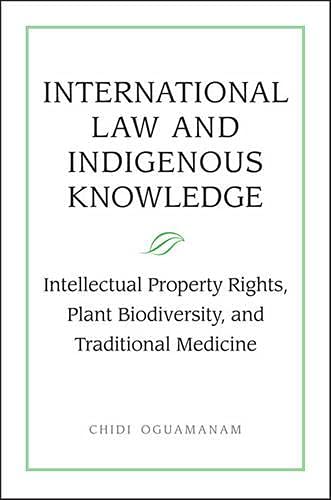

Most ebook files are in PDF format, so you can easily read them using various software such as Foxit Reader or directly on the Google Chrome browser.
Some ebook files are released by publishers in other formats such as .awz, .mobi, .epub, .fb2, etc. You may need to install specific software to read these formats on mobile/PC, such as Calibre.
Please read the tutorial at this link. https://ebooknice.com/page/post?id=faq
We offer FREE conversion to the popular formats you request; however, this may take some time. Therefore, right after payment, please email us, and we will try to provide the service as quickly as possible.
For some exceptional file formats or broken links (if any), please refrain from opening any disputes. Instead, email us first, and we will try to assist within a maximum of 6 hours.
EbookNice Team

Status:
Available0.0
0 reviews
ISBN 10: 0802039022
ISBN 13: 9780802039026
Author: Chidi Oguamanam
In the past, efforts to reconcile the western concept of intellectual property with indigenous knowledge have not taken into account the schism between this knowledge and western scientific forms. As knowledge assumes increasing importance in the quest for self-determination, cultural survival, and economic empowerment, the gulf between indigenous and western scientific knowledge assumes a new meaning. In International Law and Indigenous Knowledge, Chidi Oguamanam argues that the crisis of legitimacy indigenous knowledge poses for the intellectual property system compels a re-thinking of the concept of intellectual property itself.
Drawing on interdisciplinary research,International Law and Indigenous Knowledge takes as its framework the legal doctrinal methodology, focusing on international legal and policy developments regarding the protection of indigenous knowledge. Using traditional medicine and biodiversity to illustrate his thesis, Oguamanam argues that recent international legal and policy developments in the direction of a cross-cultural approach to intellectual property rights are desirable trends. Such developments come closer to addressing the rift between western and non-western knowledge systems as well as the crisis of legitimacy in the conventional intellectual property system.
1. General Introduction and Overview
2. Conceptual Perspectives on Biodiversity, Traditional Knowledge, Intellectual Property, and the Protection of Indigenous Peoples in International Law
3. International Law and Traditional Knowledge of Plant-Based Therapy
4. The Sociocultural Context of Traditional Knowledge of Plant-Based Therapy
5. Intellectual Property Rights and Traditional Knowledge of Plant- Based Therapy: The Filtration of Indigenous Knowledge
6. Toward a Cross-cultural Dialogue on Intellectual Property Rights
indigenous law book
aboriginal law textbook
indigenous peoples' journal of law culture & resistance
knowledge and indigenous societies
indigenous knowledge (ik)
advanced indigenous law notes
principles of international law 3rd edition pdf
Tags: Chidi Oguamanam, International, Law